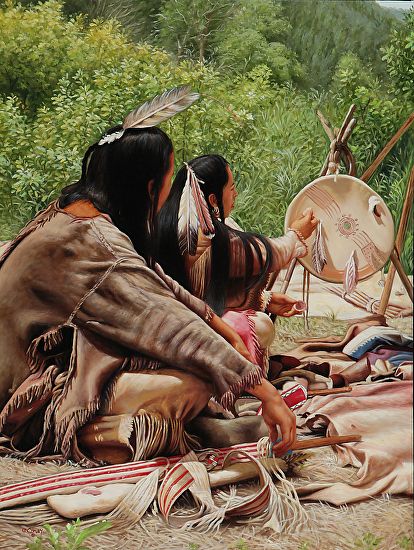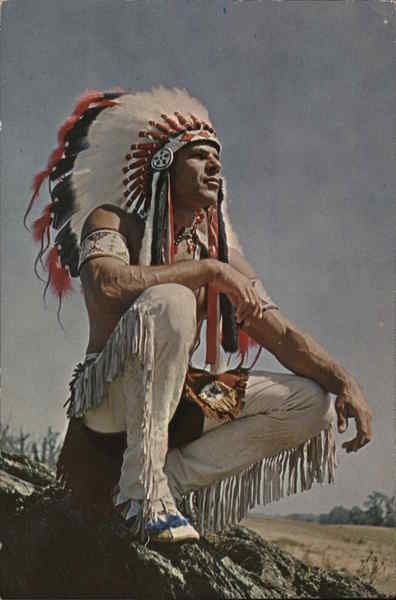
The Cree were plains
Indians. Today their village was full of activity. A hunting party had
just returned after a very successful hunt. The braves were already
around the great council fire, telling of their exploits. Among these
warriors was Slow Tongue, whose bravery and courage among the Cree was
never questioned.
When all the
celebrating was over, Slow Tongue returned to his tepee and his family.
His young son, Swift Hawk, had waited up for him and, with pride in his
eyes, he looked up into his father’s face and said, “I am very proud to
have you for my father.”
“My young son, it is
long past your bedtime and you should have closed your ears to the
night noises of the prairie many hours ago. But I must also say that I
am proud to have you as a son and tomorrow we shall talk and I shall
tell you all about the hunt. ” Slow Tongue turned to leave his son’s
side when he heard a noise at the entrance of his tepee.
“Slow Tongue,” a voice called quietly, “it is I, Seeing Bear. Come, I must speak with you. ”
Slow Tongue left the
tepee. “Why do you call me from my tepee so late in the night, Sleeping
Bear,” he asked. “I am tired and my buffalo robe beckons to me to come
and wrap myself in its warm folds, for my body aches.”
“Look, Slow Tongue!
Look to the north! At first I thought the heat of the day had made me
see things that do not exist. But now I am sure it has not. Look and
tell me what you see.”
Slow Tongue turned
his head to the north and gazed out into the darkness of the night. Far
in the distance he saw a red glow which disappeared, appeared again, and
disappeared many times.
“What can it mean, Slow Tongue?”
“It is a message,
Seeing Bear. The fire signal tells that the tribes of the plains are
gathering for the Sun Dance. Truly this is great news. Tomorrow we must
break camp and leave for the northern meadow of the Blue Star, for it is
there that the great celebrations will be held. You go to the southern
part of the village and I will go to the northern part, and we will
spread the word. It is late and many are asleep, but surely this is news
for which they will be glad to be awakened.”
The next morning
there was great excitement in the Cree village. The gathering for the
Sun Dance not only meant gathering to celebrate the greatest religious
ceremony of the plains Indians, but it also meant that it would be a
time for great feasts, mock battles, ceremonial hunts, and the
recounting of the past year’s experience with many old friends. And, of
course, the men looked forward to smoking the ceremonial pipes which was
also a part of this great occasion.
The tribe had soon broken down its village and packed and the great procession headed north toward the meadow of the Blue Star.
For two days and two
nights the Cree village moved northward. Their progress was slow but
steady, and there was much gaiety. There was much to look forward to,
and many of the younger braves could hardly be kept from rushing on
ahead of the tribe.
Soon other tribes
began to join the Cree in their trek north. In all directions smoke
signals could be seen, sent up by eager messengers reporting the
movements of the tribes as they converged on the sacred grounds.
It was very clear to
Swift Hawk now that friend and enemy were walking side by side. This
was one time during the year when the burning desire to strike out at
your enemy was replaced by a stronger desire to do worship together in
the hope of a good year to come.
Soon the meadow of
the Blue Star was reached, and the tribe of Swift Hawk chose a place to
set its village in the great circle with the tribe’s sacred tepee as its
center. Campfires began to burn merrily, and the smell of cooking food
filled the air. Old and young warriors walked about to renew old
acquaintances and talk about what had happened during the past year.
Dancers could be seen here and there practicing seriously for the time
of the great ceremony.
Soon word spread
through the encampment that there were to be riding contests at the far
west side of the meadow on the following day. These contests would be
open to young braves who had made their first buffalo kill during the
last year. This made Swift Hawk leap and shout for joy. Just last month
he had brought down his first buffalo. This meant he could enter the
riding contest. For many years now Swift Hawk had watched the contests
from afar. Each year he promised himself that next year he would enter
and win. Each year his father told him to be patient and that his time
would come.
It was a very
difficult contest to test the skills of the young warriors. Each boy was
to start his ride from the top of a hill that sloped sharply down into
the meadow. At every one-hundred-yard point along a twisting path down
the steep slope, for a distance of five hundred yards, were four sets of
poles, two poles to each set. Each set was driven in the ground a
buffalo’s length apart until they stood between four and five feet above
ground. Between these two poles a buffalo hide was stretched to look
like a buffalo running directly toward the sloping path, his flank
toward the young warriors as they rode down.
Each young brave was
allowed a bow of his choice, four arrows, and a quiver. The brave, when
given the signal to go, would race down the slope at full speed.
Drawing an arrow from the quiver and bending his body down under the
neck of his pony and holding on with his feet, he would aim his arrow
under the neck of the pony and shoot the arrow into the buffalo hide. He
would do this with each of the four arrows.
Such a contest would
surely test the strength and courage of any young brave. But young
Indians were brought up to fear little and to welcome a test like this.
For this reason it was no surprise to the great chieftains when a rather
large group of young braves gathered at the starting point the next
morning. Each boy sat astride a fine looking pony, usually the gift of
his father or some other leading member of the tribe. Each boy had his
bow, his quiver, and four very special arrows which had been worked over
and cared for like a pet or one of the family.
Final instructions
were given to the young braves, and the riding contest was on! There was
a great cheer from all who were watching as each rider left the
starting point. This was a friendly match among boys from many tribes
that often fought each other the rest of the year. Down the steep slope a
lone warrior could be seen stationed at each buffalo hide. Here he
could not only retrieve arrows but help to judge the young braves as
they rode by and fired at the target.
Soon it was Swift
Hawk’s turn. Remembering all that his father had taught him, he dug his
heels into his pony’s sides and started his fast and dangerous ride.
Carefully he drew an arrow from the quiver; then bending under the
pony’s neck, he placed the arrow to the bow, and as the target came into
view, Swift Hawk let his arrow fly! He heard the plunk as the arrow
struck the hide. With his head still under the pony’s neck and riding so
hard, he could hardly have seen where it had landed. But a loud cheer
told him that he had made a good shot. Down the steep, winding course,
Swift Hawk swiftly shot his arrows at the three other targets, and went
back toward the starting point.
As he reached the
hilltop he heard a great shout go up. Looking down the course he saw a
young Crow brave just turning his pony to return to the starting point.
The loud cheer meant that he had ridden well and made many good hits.
One by one each of
the other young braves made his attempt but none could equal the riding
and skill of the young Crow Indian. And so it was when the last
contestant had made his ride and fired no better than the rest that the
Crow brave was announced as the winner. Swift Hawk was one of the first
to reach his side and congratulate him on his victory. Deep in his
heart, Swift Hawk was sad. But he was also very happy for this young
brave. Surely the young man had deserved to win; and, above all, Swift
Hawk realized how happy the young brave and his family must be that he
had won.
The contest over,
Swift Hawk returned to his home and his father, disappointed but not
unhappy now. There would be other contests, and this was a time of
celebration and joy. His father found him sitting beside a tree stump.
“You did very well,
my son,” Slow Tongue said, placing his hands upon Swift Hawk’s
shoulders. “The Crow boy who won did just a little bit better, but all
the Cree are proud of you. There will be other contests and many games.
Soon your turn will come. But even if it should not, remember what I
have told you. As long as you play fair with your fellow braves and obey
the rules, there is nothing to be ashamed of when you lose to someone
who plays fair and has great skill.”
“Thank you, father, I shall always remember that.”
Games and new
contests were beginning. Just as Swift Hawk’s father had told him, his
time would come and sooner than he expected. In the foot race he ran
much faster than any of his fellow braves, winning easily. Swift Hawk
was as good a winner as he had been a good loser, boasting to no one
about his victory.

